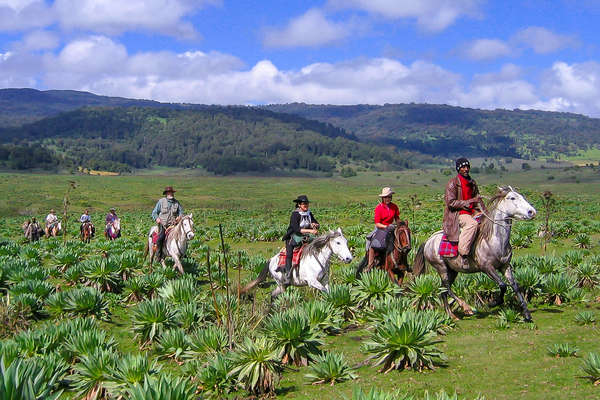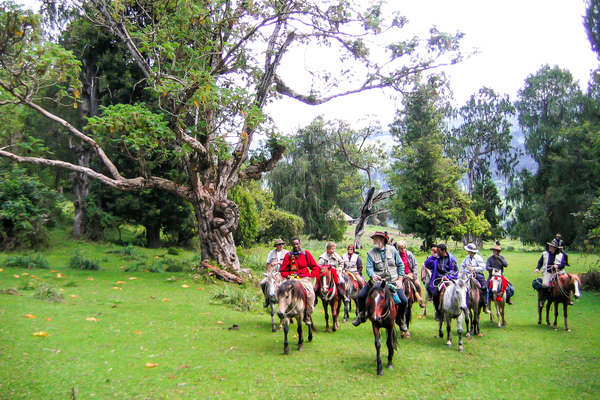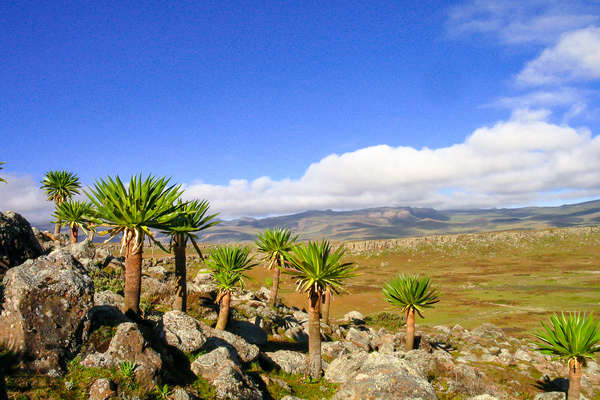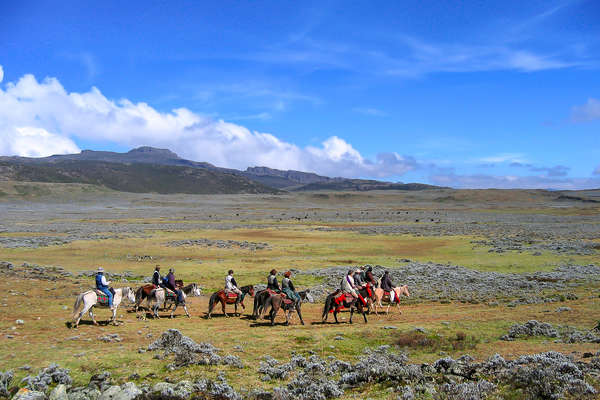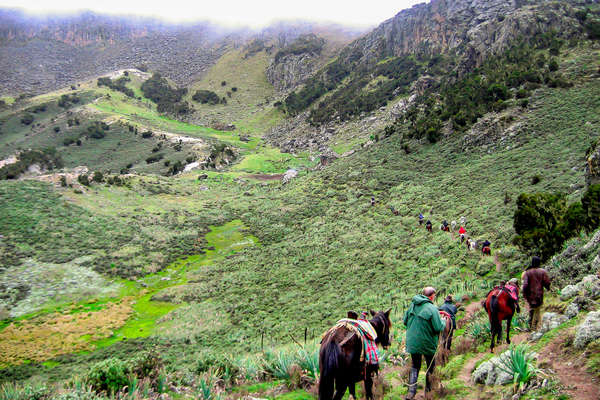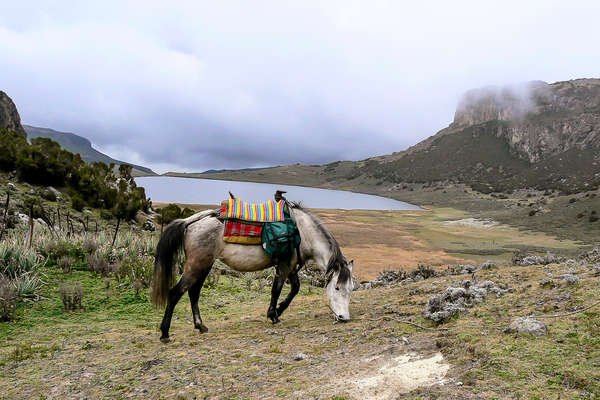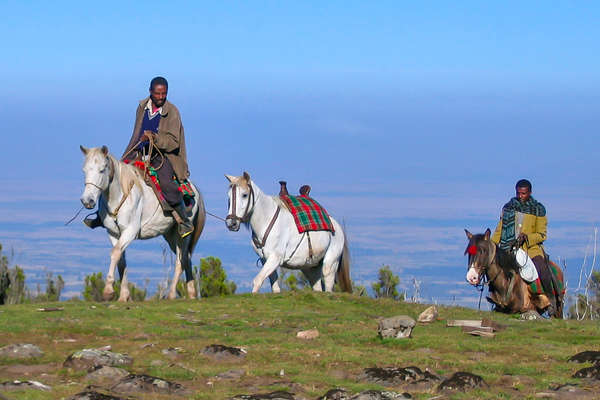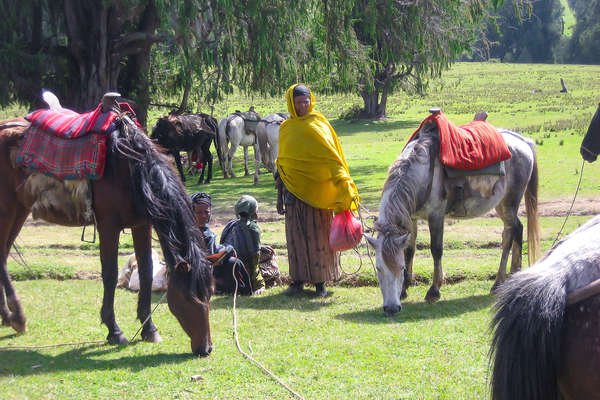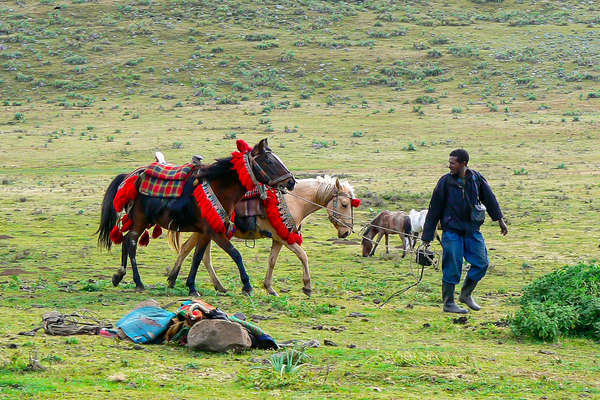Comfort
In Addis: 4***star hotel, in double or triple rooms with private bathrooms. The hotel is simple but clean and comfortable.
During the ride: First and last night at a lodge. All other nights are camping, sometimes on eco-hut grounds. Please bring your own sleeping bag. Foam mattresses are included. Please note this is a rustic ride with basic conditions and minimal comfort. During the ride, there are only 3 nights where you can shower.
Meals
The meals are cooked for by your camp cook.
Breakfast: tea, coffee, omelettes or boiled eggs, bread, jam, fruit.
Lunch: light lunch of sandwiches or pasta/rice, vegetables, fruit.
Dinner: 3-course meal starting with a home soup, meat and vegetables, and fruit as a dessert.
Water is provided.
Climate
The weather in this part of the world can be humid and unpredictable. The mountains see rainfall about 8 months a year, October marking the start of the dry season. Please expect cold nights (sometimes below 0°C), but warm days (35°C - 40°C), sometimes windy. In November the daytime temperatures are much cooler, around 15°C.
Tips
Tipping is expected. We recommend around £35-45 per rider per person.
Packing list
You are riding at high altitude and the weather can be unpredictable. Please make sure to pack sensibly and bring enough warm clothing to get you through the ride!
Your luggage is limited to 20 kg - please bring soft bags as opposed to hard sided suitcase.
Don't forget to bring sleeping bag, foam mattresses are included.
Bringing your own stirrups + stirrup leathers is recommended.
Head
- Helmets are not mandatory but recommended. We recommend that you take your own to ensure a correct fit. There are many lightweight options available nowadays
- Sunhat for when not riding
- Sunglasses - with a cord attached so they don't fly off when riding
- Buff or bandana
- Warm hat for cold nights when camping
Upper body
- Thermals (long or short sleeved)
- Long sleeved shirts provide protection from the sun and are an extra layer
- T-shirts
- Lightweight fleece or jumper
- Warm fleece or jumper (and a spare in case one gets wet)
- Warm and waterproof jacket - it can rain at any time of year and the evenings can be particularly cold
- Swimming costume, may be useful.
Legs
- Lightweight, comfortable riding trousers or jodhpurs - we recommend riding in them at home before taking them on holiday to ensure they don't rub
- Thermals
- Casual trousers for the evenings, such as jeans or tracksuit bottoms
- Waterproof over trousers
Hands and Feet
- Comfortable riding boots. We recommend hiking boots with half chaps but you may wish to take long chaps as an extra layer against inclement weather. We don't recommend taking your favourite long leather boots in case they get damaged and because the terrain is not suitable.
- Waterproof shoes/boots can be useful for abundant dew in the mornings or when it rains
- Trainers or equivalent light shoes for moving around the camp in the evenings
- Several pairs of warm, thick socks
- Gloves - your hands are particularly exposed to the sun, cold or rain whilst riding. Waterproof gloves can be particularly useful
Nightwear
- Sleeping bag. You need at least a comfort factor down to minus 5-10°C.
- Sleeping bag liner - silk, cotton or fleece - adds an extra layer
- Mattresses are provided, you can bring a small inflatable or foam mattress for extra comfort.
- Pyjamas or tracksuits or thermals for sleeping in
Other useful items
- Solar powered battery charger.
- Towels - camping ones will both dry and pack more easily
- Small backpack for accessing items required during the day (carried by support crew)
- Camera and high capacity memory card. Spare battery
- Bumbag for carrying your camera and small items whilst riding
- Headtorch or small torch for moving around at night - bring spare batteries and bulbs
- Water bottle (2 litres or 2 x 1 litre)
- Swiss army knife
- Field glasses
- Wet Wipes or equivalent (for when washing facilities aren't available)
- Toilet paper and a lighter to burn it with
- Small plastic bags for rubbish
- Ear plugs (for light sleepers)
Medical kit
- Any medication you regularly take
- Sunscreen and lip balm - should be high factor
- Insect repellent, preferably containing deet
- Blister plasters in case of any rubs
- Antiseptic cream, plasters, aspirin, anti-histamine, insect-bite salve etc...
- Spare prescription glasses/contact lenses
- Eye drops
- Imodium or similar anti-diarrhoea medication
- Re-hydration sachets
- Water purification tablets
- Antiseptic wipes
- Handwash gel
- Micropur tablets to purify water
Miscellaneous
- The stirrups and stirrup leathers are small so if you have long legs or big feet it is a good idea to bring yours.
- Please don't take a hard sided suitcase. Your luggage should be soft sided with a capacity of 60-80 litres. We recommend taking a backpack or similar.
- Backpacks cannot be worn whilst riding. We recommend a small bumbag or a coat with pockets so that you can carry small items with you during the day (passport, camera, sunscreen, lipbalm etc)
- We recommend travelling in your riding boots and carrying your hat and some riding clothes in your hand luggage - then if your luggage goes astray you are still able to ride!
- We recommend taking a copy of your passport and insurance documents with you in case you lose your originals
- Please take your rubbish home with you. There are no recycling facilities, so take your used batteries, aerosols etc back home and dispose of them appropriately. Try to leave excess packaging material at home before travelling


